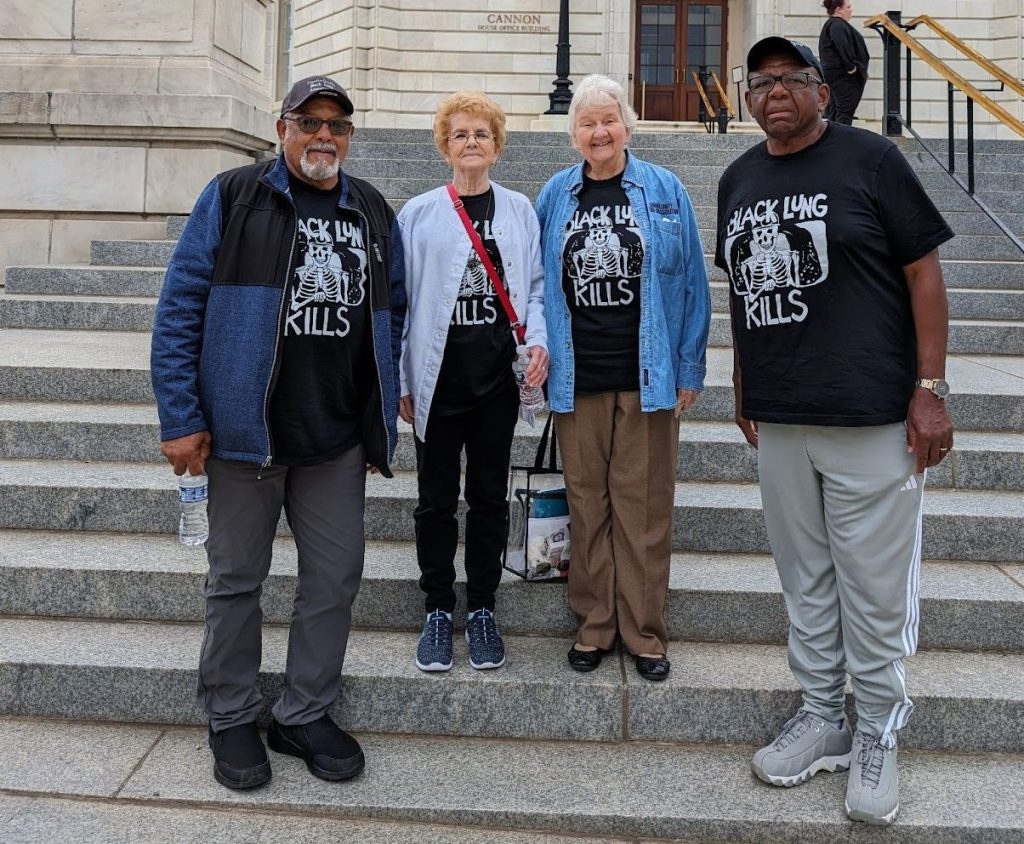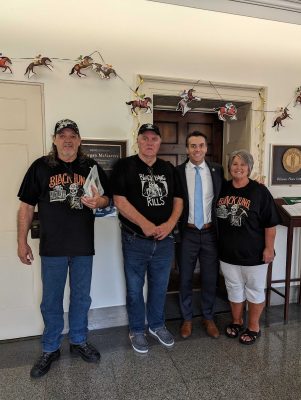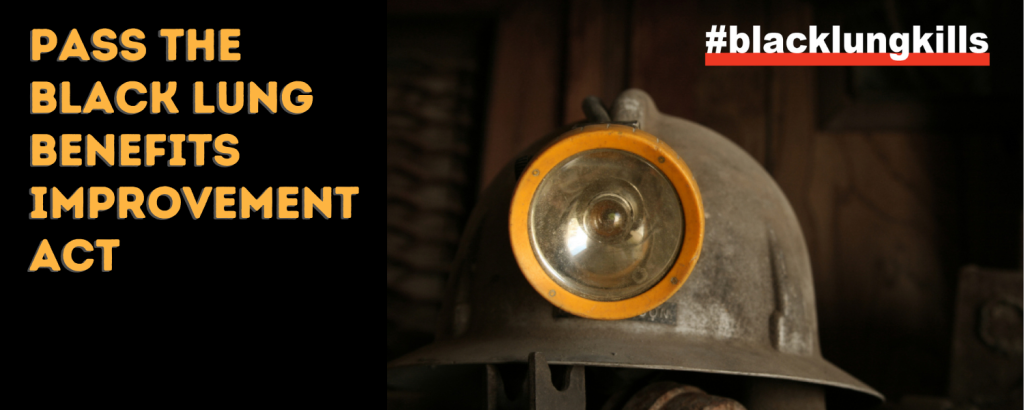Front Porch Blog
By Brendan Muckian-Bates, Appalachian Citizens’ Law Center, and Quenton King
This blog originally appeared on the ACLC website

Members of the West Virginia Black Lung Association pose in front of the Cannon House Office Building. Photo by Appalachian Voices
The black lung epidemic continues to ravage mining communities across Appalachia as every year, more and more younger miners contract this preventable occupational disease. With each new diagnosis, households are torn between two equally difficult choices to make: continue working to make ends meet in a toxic environment, or retire early and hope that the benefits miners are entitled to will be enough to sustain a family.
Recognizing the difficulty countless households have with these decisions, members of the West Virginia, Virginia, and Kentucky Black Lung Associations traveled in early May to Washington, D.C., to meet with legislators about the need to increase miners’ benefits, which have failed to keep pace with inflation.
Ask your lawmakers to support miners with black lung and their families!
To make sure that all miners with black lung receive the benefits they deserve, in 1978 Congress set up the Black Lung Disability Trust Fund — paid for through a tax on coal mine operators — that covers those costs when the coal company responsible for a miner’s disease is unable to pay for their benefits, often due to bankruptcy. According to our most recent report, miners currently enrolled in the black lung program receive over 30% less than the value of the original federal benefit stipend when the Black Lung Disability Trust Fund was established. At just $773 per month for a single miner and $1,159 for a miner and a dependent, these meager benefits leave many families struggling financially.
Undeterred by previous inaction on the part of Congress to fix the broken benefits system, miners and advocates met with over a dozen congressional offices to highlight the concerns that miners and their families face on a daily basis. The Black Lung Association specifically is asking for a member of Congress to introduce a bill that would increase the monthly black lung stipend in line with inflation every year, which is already included in the Black Lung Benefits Improvement Act but has been stalled this Congress.
The first day on the Hill began with a meeting with Sen. Joe Manchin, I-W.Va., who echoed many of our concerns. Manchin has been a co-sponsor on the Black Lung Benefits Improvement Act and the Relief for Survivors of Miners Act, two bills that would help improve the benefits system for miners and their families. This is his last term in Congress, and with his exit, Black Lung Association members fear there might not be a West Virginia sponsor on the Black Lung Benefits Improvement Act for the first time since the bill was originally introduced a decade ago.
Shortly after that meeting, the group met with Sen. Shelley Moore Capito’s (R-W.Va.) office to share those concerns, relaying the hope that she would take the lead and fill the role that Manchin has played in advocating for miners’ health, safety and a stronger benefits program.

Members of the Kentucky and Virginia Black Lung Associations met with Rep. McGarvey, D-Ky.), who introduced the Relief for Survivors of Miners Act. Photo by Appalachian Voices
The offices of Sen. Mitt Romney, R-Utah, and Sen. Mitch McConnell, R-Ky. similarly expressed support for miners’ issues. Romney himself is a minority member of the Senate Health, Education, Labor & Pensions committee, where the Black Lung Benefits Improvement Act currently sits awaiting a hearing. Additionally, Sen. John Hickenlooper’s, (D-Colo.) office, which has been spearheading much of the work to support the Senate Health, Education, Labor & Pensions committee hearing on health and safety practices in the mining industry, gathered first-hand information about the struggles miners and dependents face when applying for benefits and the inadequacy of benefits currently.
Members of Congress who showed a willingness to support miners with black lung disease also expressed concern about the solvency of the Black Lung Disability Trust Fund. A primary concern that Republicans have relayed to miners and their advocates over the past decade has been the debt-to-revenue ratio within the fund. The fund is supported by an excise tax on coal, which received a permanent boost in the Inflation Reduction Act in 2022. The revenue from the excise tax is typically enough to cover the benefits paid out to miners with black lung. However, the fund pays much more than that on interest for past debt that it borrowed from the Treasury, and it must continue borrowing from the Treasury to meet interest payments.
Some of the debt is a result of poor oversight of coal companies. The Government Accountability Office reported in 2019 that three coal company bankruptcies between 2014 and 2016 have added more than $800 million in black lung benefit liabilities to the fund. Years of lax oversight from the Department of Labor failing to ensure companies have the necessary collateral to cover these liabilities is partly to blame, something both Democrats and Republicans have been critical of, and which the Department of Labor’s new proposed rule on self-insurers is intended to fix.
Rep. Morgan Griffith, R-Va., met with us and expressed interest in finding a way to improve the black lung benefits program, including a cost-of-living adjustment, while addressing legacy debt that is burdening the fund.
In 2008, Congress forgave a portion of the debt while refinancing the remaining balance. The Black Lung Association also hopes to work with Rep. Mike Bost, R-Ill., on black lung-related issues as well. Bost has supported the Miners Protection Act (2017) and the American Miners Act (2019), and represents a district in Southern Illinois where coal mining is still an active means of employment for many. In Griffith and Bost’s districts, there are nearly 2,000 miners and dependents receiving federal black lung benefits, while Griffith’s district alone has the third highest number of black lung benefit recipients in the country.
At the end of their first day of meetings on the Hill, members of the Black Lung Association sat down with a reporter from Bloomberg News for a group interview in the House cafeteria. Members told the reporter that they made the long drive to Washington because it’s important for lawmakers to hear directly from people with experience with the black lung benefits program and the disease itself. The interview hasn’t been published yet, but stay tuned!
As the 118th Congress winds down, Appalachian Voices, the Appalachian Citizens’ Law Center and the Black Lung Association will continue to fight to secure benefits that miners and their dependents are rightfully owed.
Make sure your legislators know that taking care of people with black lung and their families is important to you! Send your lawmakers a letter, and tell them why improving black lung benefits matters to you.
On behalf of the National Black Lung Association, Appalachian Citizens’ Law Center and Appalachian Voices, we’d like to thank the Sierra Club, Ohio River Valley Institute, the BlueGreen Alliance and West Virginia Rivers for their financial support for the black lung lobby day.
PREVIOUS
NEXT

Leave a comment
Your email address will not be published. Required fields are marked *
One response to “Miners and advocates travel to Washington to ask legislators to strengthen black lung benefits”
-
Please pass laws that will insure permanent benefits to miners & spouses that suffer from Black Lung. Without this help miners will not have the available health care necessary to live. My husband suffers from Complicated Black Lung which is a certain death sentence. Monthly benefits help miners who only survive on BL & SS.


Leave a Comment